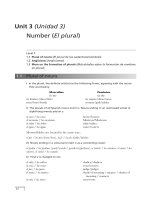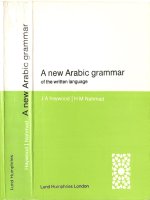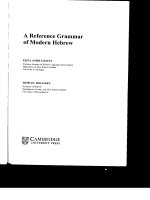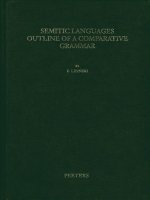A Student Grammar of Spanish - Number
Bạn đang xem bản rút gọn của tài liệu. Xem và tải ngay bản đầy đủ của tài liệu tại đây (133.01 KB, 14 trang )
Unit 3 (Unidad 3)
Number (El plural)
Level 1
1.1 Plural of nouns (El plural de los sustantivos/nombres)
1.2 Anglicisms (Anglicismos)
1.3 More on the formation of plurals (M
´
as detalles sobre la formaci
´
on de nombres
en plural)
1.1 Plural of nouns
i In the plural, the definite article has the following forms, agreeing with the nouns
they accompany:
Masculine Feminine
los the las the
los hombres/chicos/libros las mujeres/chicas/mesas
men/boys/books women/girls/tables
ii The plurals of all Spanish nouns end in s. Nouns ending in an unstressed vowel or
diphthong merely add an s:
la casa / las casas house/houses
el mexicano / los mexicanos Mexican/Mexicans
la tribu / las tribus tribe/tribes
el agua / las aguas water/waters
Monosyllables are treated in the same way:
el pie / los pies (foot/feet), la fe / las fes (faith/faiths)
iii Nouns ending in a consonant insert e as a connecting vowel:
el jard´ın / los jardines (yard/yards / garden/gardens), el m´artir / los m´artires, el autor / los
autores, el canal / los canales
iv Final z is changed to ces:
el c´aliz / los c´alices chalice/chalices
la cruz / las cruces cross/crosses
el juez / los jueces judge/judges
el matiz / los matices shade of meaning / nuance / shades of
meaning / nuances
la ra´ız / las ra´ıces root/roots
32
3 Number
la voz / las voces voice/voices
el desliz / los deslices error/slip-up / errors/slip-ups
v The nouns ending in a stressed vowel also add es:
el bamb´u/los bamb´ues bamboo/bamboos
el esqu´ı/los esqu´ıes ski/skis
el rub´ı/los rub´ıes ruby/rubies
el tab´u/los tab´ues taboo/taboos
el marroqu´ı/los marroqu´ıes (frequently in
speech = los marroqu´ıs)
Moroccan/Moroccans
el magreb´ı/los magreb´ıes person(s) from the Maghreb (North Africa)
el yemen´ı/los yemen´ıes Yemeni/Yemenis
*el hind´u/los hind´ues Hindu/Hindus
el israel´ı/los israel´ıes Israeli/Israelis
* Also, although incorrectly but very common = Indian (from India).
However:
mi pap´a = my pop/dad mis pap´as (M) = my mom and dad/parents
vi Unstressed endings in is, es and us in words of more than one syllable, pure Latin
terms, and family names ending in z not stressed on the last syllable do not change:
el/los an´alisis analysis/analyses
la/las crisis crisis/crises
el/los lunes Monday, Mondays
el/los d´eficit deficit/deficits
el/los ultim´atum ultimatum/ultimatums
el/los super´avit surplus
Mart´ınez (name) / los Mart´ınez Martinez / (the) Martinez
el virus / los virus virus/viruses
vii Final diphthongs ending in y require es for their plural:
el rey / los reyes king/kings
el convoy / los convoyes convoy/convoys
1.2 Anglicisms
i Some Anglicisms have the English plural form though usage is uncertain here:
el g´angster / los g´angsters gangster/gangsters
el r´ecord / los r´ecords record/records
el club / los club(e)s club/clubs
el l´ıder / los l´ıders / los l´ıderes the leader/leaders
el m´ıster / los m´ısters soccer coach (Who would guess m´ıster?)/
soccer coaches
Understandably, from the point of view of pronunciation, the plural of el lord is los lores.
33
ASTUDENT GRAMMAR OF SPANISH
ii Some nouns have stress on different syllables in singular and plural:
el car´acter / los caracteres character/characters
el r´egimen / los reg´ımenes r´egime/r´egimes
el esp´ecimen / los espec´ımenes specimen/specimens
1.3 More on the formation of plurals
i In the formation of plurals, the place of the stress and the sound of the final
consonant of the singular remain the same, and the spelling reflects this:
el almac´en / los almacenes warehouse/warehouses
el ca˜n´on / los ca˜nones canyon/canyons
la imagen / las im´agenes image/images
el jard´ın / los jardines yard/yards /garden/gardens
el/la joven / los/las j´ovenes youth/youths
el l´apiz / los l´apices pencil/pencils
el margen / los m´argenes margin/margins
el origen / los or´ıgenes origin/origins
la virgen / las v´ırgenes virgin/virgins
ii Some plurals in Spanish do not have a concise equivalent in English:
los t´ıos the uncle and aunt
los padres the father and mother / parents
los pap´as (M) the father and mother / parents
Exercises
Level 1
i Put the following nouns in the plural with the definite and indefinite article:
Example
muchacho > los/unos muchachos, muchacha > las/unas muchachas
padre, madre, libro, estudiante, pared, ´arbol, ingl´es, franc´es, martes, primavera, oto ˜no,
pie, tribu, matiz, voz, atlas, caries, rat´on, c´arcel, buey, jersey, alem´an, reloj
ii Fill in the nouns in their plural form. Note that est ´a means “is” and est ´an means
“are.” These two forms are from the verb estar = to be
Example
El vaso est´aenelsal´on Los vasos est´an en los salones
El ni ˜no est´aenlacasa El jard´ın est´a detr´as (behind) del edificio
El ´arbol est´aenelparque La hoz est´aenlamonta˜na
El gato est´a cerca de (near) la puerta La naci´on est´a contenta
El l´apiz est´aenlamesa La ni ˜na est´a feliz
La flor est´aenelflorero La tribu est´aenlaselva
iii Put in the singular. See note on the verb estar immediately above.
Example
Los alumnos est´an en los jardines – El alumno est´aeneljard´ın
Hay ´arboles en los jardines
34
3 Number
Los estudiantes est´an en las aulas
Los cuadros est´an cerca de las ventanas
Los ingleses est´an en los hoteles
Los alemanes est´an en los salones
Los reyes est´an en los palacios
Los convoyes est´an en las carreteras
Las bicicletas est´an en las banquetas (M = sidewalks/pavements)
iv Paired activity
Objective – learn the plural of nouns
Method –Two people collect ten nouns each from the various lists above. Each person
asks the other what the plural of a given noun is.
Example
PREGUNTA: ¿Cu´al es el plural de ingl´es (What is the plural of ingl´es)?
RESPUESTA: El plural de ingl´es es ingleses
When all twenty nouns have been dealt with, the teacher/instructor will call the class
together to discuss findings.
Level 2
2.1 Compound nouns (Nombres compuestos)
2.2 Spanish plural = English singular (Plural espa ˜nol = singular ingl ´es)
2.3 Spanish singular = English plural (Singular espa ˜nol = plural ingl ´es)
2.4 Agreement in number and verb (Concordancia entre plural y verbo)
2.5 Noun + ser + noun (Nombre + ser + nombre)
2.1 Compound nouns
Usually, the first noun is put in the plural but the second noun may also take a plural s,
although this is less frequent, and would even sound strange if, for example, the last word
of the following expression had an s: un veh´ıculo todo terreno, veh´ıculos todo terreno.Itshould
be added that, since compound nouns and their pluralization are a comparatively recent
linguistic phenomenon, hard and fast rules are still difficult to come by, and Spanish
speakers hesitate themselves, so we are in good company. The following is just a small
selection of the ever-increasing number of compound nouns as they are used in the plural:
las bocacalles street entrances
las ciudades dormitorio dormitory towns
las ciudades modelo model cities
las fechas tope final/closing dates
las ideas clave key ideas
los coches bomba car bombs
los coches patrulla patrol cars
los factores sorpresa surprise factors
los sectores clave key sectors
los l´ımites tope final/closing dates
las c´elulas madre mother cells
los retratos robot photofits
35
ASTUDENT GRAMMAR OF SPANISH
las carreras reina main races
las horas punta commute/rush hours
las horas pico (M) commute/rush hours
Note: Clave is certainly one of the nouns often used in the plural.
los elementos claves key elements
las ideas claves key ideas
las actividades claves key activities
2.2 Spanish plural = English singular
There is often a plural noun in Spanish corresponding to an English singular noun:
las agujetas stiffness (in limbs) (but shoelaces in M!)
*por los aires through the air
las andas portable platform (for religious processions)
*los aplausos applause
*las barbas beard
*las bodas wedding
los cascotes/escombros rubble
*los celos jealousy
*los conocimientos knowledge
*(los) Correos Post Office
las cosquillas tickling
con creces with interest (financially), abundantly
los cubiertos cutlery
los datos information/data
los deberes homework
¡Buenos D´ıas! Good morning!
los efectivos personnel
las enaguas petticoat
a mis expensas at my expense
*las fuerzas strength
*los funerales funeral
*los honorarios fees (professional)
las investigaciones research
las lluvias rain(s)
las municiones ammunition
¡Felices Pascuas/Navidades! Merry Christmas!
*las nieves snow
los pertrechos gear
hacer progresos to make progress
*los remordimientos remorse
las tinieblas darkness
los transportes (p´ublicos) public transportation
en v´ısperas de on the eve of
36









